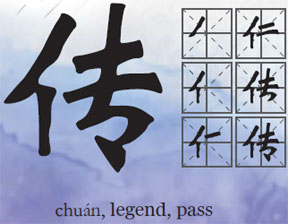Postman delivered a versatile expression

Rumors, legends, teamwork and writing can all be invoked with this character
Whether you're spreading rumors or legends, you need 传。
It's said that a legend is simply a rumor with stamina. Faced with the mundane details of everyday life, people sometimes need to escape to a virtual, magical word for sweet respite. An imaginary universe, heroic characters, magic and exciting adventures - there's no limit to the wizardry of escapism.
In Chinese, the word for legend is 传奇 (chuánqí), with 奇 (qí) meaning "strange, unusual, or extraordinary," but it's with the passage, or 传 (chuán), of these legends that we shall concern ourselves.

The traditional version of 传 is 傳, was originally a noun, pronounced as chuan, referring to postal carriages in ancient times. It is a pictophonetic character, with the "people" radical "亻" indicating the meaning, the postman, while 專 serves as the pronunciation guide.
Gradually, this term was extended to serve as a verb, meaning to hand something from one person to another, or from one generation to the next. This leads to the term 祖传秘方 (zǔchuán mìfāng), a secret prescription handed down from an early ancestor of the family; or 传经送宝 (chuánjīng sòngbǎo), to pass on one's valuable experience. On a sports team, there is the term 传帮带 (chuán bāng dài), which consists of three one-character verbs: pass, help and lead, which refers to the tradition of veterans helping rookies. The idiom 传宗接代 (chuánzōng jiēdài) means to have a son to carry on one's family name.
Passing or handing down information with the character 传 can be broader; for this meaning, we have the word 传播 (chuánbō, spread, publicize, disseminate). For example, 传播谣言 (chuánbō yáoyán) is "to spread rumors," while rumor itself can be translated into 传言 (chuányán). It is said that bad news has wings and Chinese has a similar proverb: "好事不出门,坏事传千里。(hàoshì bù chū mén, huàishì chuán qiānlǐ. Good news never goes beyond the gate; while bad news spreads far and wide.)"
传 can also mean "express" or "convey". Language isn't the only way one might express oneself. Lovers convey their feelings through eye contact, which is called 眉目传情 (méimù chuánqíng, flash amorous glances); vivid imagery in writing and painting can also express strong emotions, so it is called 传神之笔 (chuánshén zhībǐ, pen that conveys spirit). If something is too subtle or profound to be conveyed, you can say 其中奥妙,不可言传。(qízhōng àomiào, bù kě yánchuán. What lies within defies all description.)

In modern Chinese, we have the word 传染 (chuánrǎn, infect, be contagious). It can be used for disease, as in, 她怕把病传染给孩子。(Tā pà bǎ bìng chuánrǎn gěi háizi. She was afraid of giving the disease to her child.) Emotions, feelings and atmospheres are also contagious. You can say, 他的热情传染给了和他一起工作的每一个人。(Tā de rèqíng chuánrǎn gěi le tā yīqǐgōng zuò de měi yīgè rén. His enthusiasm infected everyone who worked with him.)"
As zhuan, this character is a noun with three meanings. The first meaning is "commentary on classics". For example, Confucian classics and the scholarly commentaries on them are called 经传 (jīngzhuàn). The second meaning refers to biographies, which, as part of ancient Chinese history texts, are called 列传 (lièzhuàn); autobiography is 自传 (zìzhuàn) and a profile or biographical sketch is called 小传 (xiǎozhuàn). The last meaning is "novel or story
written in a historical style". One example is the book《水浒传》 (shuǐ hǔ zhuàn), one of China's four great classics, translated as Outlaws of the Marsh.
Proverbs involving zhuan include 言归正传 (yán guī zhèng zhuàn), meaning "to come back to the story" or "return to the subject"; 树碑立传 (shù bēi lì zhuàn, to write a biography and build a monument for somebody) refers to actions that boost one's prestige and popularity, often used pejoratively. If you refer someone as 名不见经传 (míng bú jiàn jīngzhuàn), you mean that he or she is not a well-known figure, or more directly, is a nobody.
So, with a little help, you now know how to tell legends, encourage teammates, and write an autobiography - not bad for a little character about an ancient postal service.
Courtesy of The World of Chinese, www.theworldofchinese.com
The World of Chinese
(China Daily Africa Weekly 04/14/2017 page23)






























